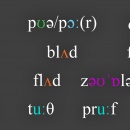 |
Difference between “ausdrucken” and “ausdrücken” in German
The verbs “drucken” and “drücken” in German are often confused by non-native speakers, especially by those who cannot pronounce the vowel (...)
May 27, 2016 – Jakub Marian – German
|
 |
Difference between ‘intrinsic’ and ‘inherent’
If you read the dictionary definitions of the words intrinsic and inherent, you will probably come to the conclusion that they mean (...)
May 25, 2016 – Jakub Marian – English
|
 |
‘Invest time in’ vs. ‘invest time into’ in English
Long story short, the correct idiom is “invest time in something” (meaning “to put your time into something”):
correct He invested a (...)
May 23, 2016 – Jakub Marian – English
|
 |
Is German an SVO language?
The order of the subject, verb, and object in a sentence (abbreviated S, V, and O, respectively) is one of the ways linguists categorize (...)
May 22, 2016 – Jakub Marian – German
|
 |
What you need to know about Esperanto
Esperanto is the most widely spoken constructed language in the world today, spoken by several million speakers. What that means is that (...)
May 22, 2016 – Jakub Marian – Esperanto
|
By the way, have you already seen my brand new web app for non-native speakers of English? It's based on reading texts and learning by having all meanings, pronunciations, grammar forms etc. easily accessible. It looks like this:
 |
Pronunciation of ‘oo’ in English – long or short?
There are two common and three uncommon pronunciations of the digraph “oo”. In the early stages of the development of English, “oo” was (...)
April 25, 2016 – Jakub Marian – English
|
 |
‘Musste’, ‘gemusst’ and ‘müssen haben’ in German
There are four different past tense forms for the German verb müssen (must). The easiest one to deal with is the simple past:
Er (...)
April 24, 2016 – Jakub Marian – German
|
 |
‘Lie in bed’ or ‘lay in bed’ in English
Lie, lay, lied, laid, layed… Does it even matter? We understand each other anyway, right? In fact, it does matter. Using an incorrect (...)
April 21, 2016 – Jakub Marian – English
|
 |
Difference between ‘if so’ and ‘if yes’ (and ‘if not’ and ‘if no’) in English
Imagine you are about to buy a new phone and ask, “Does the phone support 4G connection?” You could anticipate the answer and immediately (...)
April 14, 2016 – Jakub Marian – English
|
 |
‘Prefer to’ or ‘prefer over’ – which preposition?
“Which preposition should I use after the verb ‘prefer’?” is a common question among non-native and native speakers alike. Long story (...)
|

